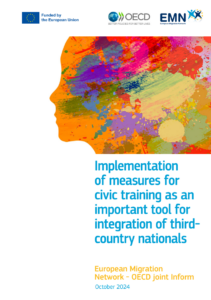EMN-OECD joint inform highlights civic training as an important tool for third-country nationals
04.10.2024The European Migration Network (EMN) and the Organisation for Economic Cooperation and Development (OECD) recently published the inform ’Implementation of measures for civic training as an important tool for integration of third-country nationals‘, focusing on civic orientation courses for third-country nationals (TCNs) across 25 EMN Member and Observer Countries. These courses play an important role in integrating TCNs into host societies by providing knowledge and skills required for their social, cultural, and political participation.
Effective integration of migrants into the host society is a key challenge and a precondition to successful migration management. Nearly all the civic orientation courses reviewed include beneficiaries of international protection. In 13 of the responding countries, these civic training courses are aimed at all legally residing TCNs.
The content of civic orientation courses centres on four core elements: understanding the social, political, and cultural realities of the host country; learning the rules, rights, and obligations within the society; promoting integration; and ensuring access to equal opportunities. Countries like Estonia for example have adapted these programmes for specific target groups such as entrepreneurs, and students, further illustrating the tailored nature of these integration efforts.
Financing for civic orientation courses primarily comes from public authorities, ensuring that participants do not bear the costs. Several EMN Member Countries reported that courses and training are, at least in part, financed by the European Union. Despite the overall trend of public funding, exceptions exist. In Austria and Belgium (Flanders), for example, participants are required to contribute to certain course costs.
Participation in these courses can be either mandatory or voluntary, depending on national policy and the specific migrant group. In countries such as the Netherlands and France, these courses are compulsory for TCNs seeking long-term residence. Absence can result in negative outcomes, such as affecting residence status or incurring financial penalties.
Digital methods are being increasingly adopted to provide more flexibility. For example, France and Poland have created mobile applications. Online and hybrid courses are also available in 14 responding countries, expanding access to these essential programmes. However, challenges remain regarding engagement and the quality of learning in such formats. Despite these hurdles, digital platforms have provided a cost-effective solution, particularly for countries with dispersed migrant populations.
You cand find the inform here.
